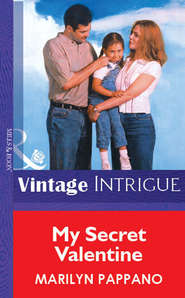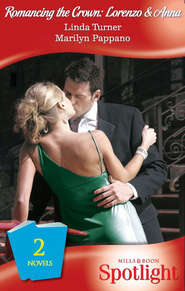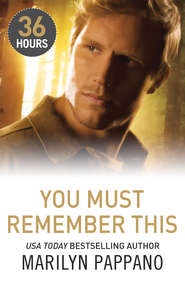По всем вопросам обращайтесь на: info@litportal.ru
(©) 2003-2025.
✖
Copper Lake Secrets
Автор
Год написания книги
2018
Настройки чтения
Размер шрифта
Высота строк
Поля
A look of distaste flashed across Reece’s face—at the use of her given name or the thought of digging through her grandfather’s files?
“Here’s the code to the gate—” Miss Willa slapped a piece of paper on top of the stack, then offered a key “—and the key to the cottage.”
Surprise replaced distaste in Reece’s expression, and witnessing that took Jones a moment longer to hear the words than he should have. Frowning, he looked at Miss Willa. “What cottage?”
“That one.” She pointed across the road. “There’s no place in town worth staying at for more than a night or two besides The Jasmine, and I certainly don’t intend to subsidize The Jasmine when you can stay here and keep your attention on your work.”
He generally liked staying at or near the job site. On long-term jobs, he often moved into a small trailer, which beat a motel any day. But he didn’t particularly appreciate being told where he would stay, or the assumption that he needed to be told to stay focused on his job. He was a responsible man, and while Miss Willa might well be accustomed to giving orders, he wasn’t accustomed to following them, except in the narrow scope of the job.
But he wasn’t stupid enough to argue, not when her high-handedness fit right in with his needs.
“I appreciate the invitation.” His sarcasm sailed right past Miss Willa’s ears, but earned a faint smile from Reece. “I should warn you, my dog travels with me.”
“Keep him quiet, keep him away from my house and clean up after him, and we’ll be fine.” Miss Willa shifted her gaze then to Reece. “Lois is fixing dinner. We’ll talk when that’s over.” With a nod for emphasis, she returned to the house.
The action surprised Jones. Miss Willa hadn’t seen her only granddaughter in years, and yet she casually dismissed her?
But wasn’t that what his own father had done with him? Hell, Big Dan hadn’t just dismissed him; he’d sent him away. Though Jones had betrayed Big Dan. Did Miss Willa think the same of Reece? And was there more to it than Reece missing the old man’s funeral?
Reece wasn’t surprised. Idly she opened one of the books on the table, an oversize title with musty yellow pages and decades-old plates of the most impressive gardens of the post–Civil War South. Jones had a copy in his office back in Louisville. “Grandmother doesn’t like to discuss unpleasant matters at the dinner table,” she said by way of explanation.
“What could be unpleasant about her granddaughter coming for a visit?”
“A long-neglected visit. I haven’t been here since …” Her attention shifted from the book to the house, her gaze taking in the three stories of whiteboard siding and dark green trim, the windows staring back like so many unblinking eyes. “Since I was thirteen,” she finished, the words of little more substance than a sigh.
The summer he and Glen had been there. Why? What had happened to keep her away all that time? A falling-out between her mother and grandparents? A petty argument that had grown to fill the years?
Or something more?
With a slight tremble in her fingers, she closed the book and smiled, but it lacked depth. “Fair Winds isn’t my favorite place in the world. It’s …”
He let a heartbeat pass for effect. Another. Then he softly supplied the word. “Haunted?”
She startled. Her gaze jerked to him and her arms folded across her middle as if to contain the shiver rippling through her. “You believe in ghosts, Mr. Jones?”
“I told you, it’s just Jones. No Mister. Why wouldn’t a house like this have ghosts? It’s nearly two hundred years old. Dozens of people have lived and celebrated and suffered and died here. Some of those spirits are bound to remain.”
“You’ve encountered such spirits before?”
“I have, and lived to tell the tale.”
He grinned, but the gesture didn’t relax her at all. Instead, a brooding darkness settled around her. “Wait until you’ve met Grandfather, if he’s still here. He might change that.”
Jones tucked the security code into his hip pocket, picked up the books and papers, then twirled the lone key on its ring around his finger. “He can’t scare me too much,” he said mildly as he started across the patio to the road. “After all, he is dead.”
Dead, but not forgotten, and still possessing the ability to frighten.
At least, he could still frighten Reece.
She watched until Jones had disappeared inside the cottage, wishing she could have claimed it for herself before Grandmother offered it to him. It was a miniature replica of the house, with a huge difference: it was memory-free and nightmare-free. Reserved for visitors, it had been off-limits to her and Mark that summer. At the moment it seemed the only safe place on all of Fair Winds.
But Jones had it, so she was going to be stuck in the house where Grandfather had lived.
And expected to go through his boxes, too. A shudder tightened her muscles as she recalled the one time she’d gone into his study. Only in the house a few days, she’d still been learning her way around, and Mark had told her that heavy dark door that was always closed led into a sunroom filled with beautiful flowers.
There’d been nothing sunny or beautiful about the room. Dark drapes pulled shut, dark paneling, the thick, heavy smell of cigars and age, and Grandfather, glowering at her as if she’d committed an unpardonable sin. He’d yelled at her to get out, and she’d scurried away, slamming the door, to find Mark laughing at the bottom of the stairs. Grandmother had chastened her, and Valerie had, too, and she’d felt so lost and lonely and wanted her dad more than ever.
Oh, God, she wasn’t sure she could do this, not even to find out what had happened those three months. Over the course of her lifetime, they added up to what? One percent of her time on this earth? Nothing. Inconsequential.
Except the months did have consequences: the nightmares, the fear, the distrust.
She breathed deeply. Across the drive, Jones came out of the cottage, climbed into his truck and drove away. She felt his leaving all the way to her bones. Aside from Lois, who must be Grandmother’s current housekeeper, there was no one left on the property but her and Grandmother.
Not a thought to inspire confidence in a drama princess.
Another deep breath got her across the patio and into the door. Dimness replaced bright sun; coolness replaced heat. Instead of pine, the lemon tang of wood polish drifted on the air, along with the aroma of baking pastry. A voice humming an old gospel tune came from the kitchen, ahead and to the right. Lois, Reece was sure. She’d never heard Grandmother hum or sing, had rarely seen her smile and couldn’t recall ever hearing her laugh.
No wonder Daddy had left the first chance he got.
She ventured farther along the hallway that bisected the house north to south. A glance through the first set of double doors showed the table in the formal dining room, set for two. Opposite was Grandmother’s study, a small room with airy lace curtains, a white marble fireplace and delicate-appearing furniture that looked hardly a year of its century-plus age.
The rooms were small, the ceilings high, the furnishings mostly unchanged. A broad hallway, easily as wide as the rooms themselves, cut through in the middle from east to west. The stairs rose from this hall, and portraits of early Howards—and, in one case, an early Howard’s prized horse—lined the walls. None of Grandfather, Reece noted with relief. His memory was enough to haunt her. She didn’t need portraits, too.
The salon was empty, the door to Grandfather’s office closed. Presumably Grandmother was upstairs. Readying a room for her? Gathering items Jones might need in the cottage? Or getting ready for the noon meal? After all, Howard women dressed for meals.
Reece paused outside the study door. The house was oppressive. So many rules, so little laughter. Her father had loved to laugh. Elliott Howard hadn’t taken anything too seriously. He must have felt so stifled within these walls.
She was about to go upstairs, left hand on the banister, right foot on the first tread, when a creak came from the study behind her. Another followed it, then more: the slow, steady sounds eerily similar to a person pacing. Her fingers tightened around the railing until her knuckles turned white, but she couldn’t bring herself to let go, to turn around and walk across the faded Persian rug to the door.
It was probably Grandmother, looking for more papers for Jones, having thought better of the idea of trusting the search to her. If she’d wanted company, she would have left the door open; she would have—
“Well, don’t just stand there. Either come up or get out of the way.”
So much for the theory of Grandmother. The old woman was standing on the stair landing, hair brushed, makeup freshened, a string of pearls added to the diamonds she always wore.
Reece glanced over her shoulder at the study door. The room was silent now. Just her imagination running wild. It always had, according to Grandmother. That girl lives in a fantasy world, she’d often complained to Valerie. Thinks she sees ghosts everywhere.
Heard them. Reece had never seen a ghost. She’d simply heard them, and felt them.
She loosened her grip on the banister and backed away as Grandmother descended the stairs.
“Dinner is served promptly at 12:30. Supper is at 6:30. If you miss the meal, you fend for yourself—and clean up after yourself.” With an arch look, Grandmother passed her and headed for the dining room.
Reece followed her and took a seat at the polished mahogany table as a woman about her mother’s age began serving the meal. There was iced tea in crystal goblets that predated the War, salad and rolls served on delicate plates her great-great-and-so-on grandfather had brought from France when he was still a sea captain in the early 1800s, roasted chicken and vegetables, and pie. Much more than the po’boy or muffuletta she usually had for lunch back home.
The conversation was sporadic, nothing more interesting than general comments about the weather or the food. It was ridiculous, really, to chitchat about nothing when they hadn’t seen each other in so long, but Reece was no more eager to have a serious conversation than Grandmother was willing to break her dinnertime rules.
It would have been nice, though, to have been greeted with a little more pleasure—a hug, a kiss, an I’m happy to see you. Valerie didn’t have much patience with her, but even she managed that much every time they met.











